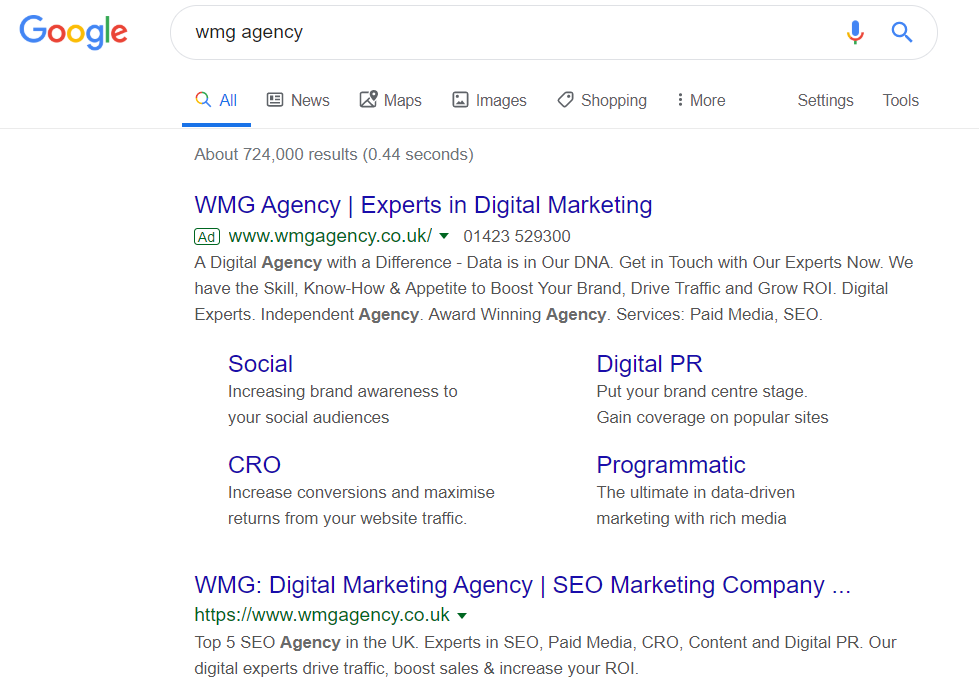Should I Be Running a Branded Search Campaign?

A common question we’re often asked is why we are (or why we’re not) bidding on a brand as part of a paid search strategy. Managing a PPC account means you’re always on the lookout for opportunities to boost performance. Unfortunately, there is no definitive rule as to when you should or shouldn’t run brand search campaigns, and what works for one brand might not be the best strategy for another. We sat down with Jamie Robson, PPC Executive at WMG, to discuss the factors considered in how effective a branded search campaign may be for a client.
Organic performance
Organic performance is one of the first factors assessed. If you’re struggling to organically rank on page one for your own brand, paying to reach that top spot can be well worth the investment – even the best SEO teams can’t significantly increase organic ranking overnight!
But sometimes, organic ranking can be out of your hands. If your brand name is shared with a common object or phrase, it will be challenging to organically outrank bigger information-based sites for these shared terms. However, with a paid search ad, we can easily jump above these sites in the search engine and appear at the top of a page, often for a very small cost per click (CPC).
Competition
Almost as important as your organic ranking, the level of competition against your brand plays a big part in whether you need to bid on it or not. Sometimes, the state of the market means if you don’t bid on your own brand, someone else will. There are very few businesses who would be happy letting a competitor appear above them for a user who specifically searched for their brand – no matter how much it costs the competitor to do so.
It’s about more than just asserting authority in the market and protecting your brand’s recognition, it’s about the cost too. If a conversion is worth £50 and a competitor bids on your brand ‘stealing’ just one conversion that you would have otherwise received, that’s £50 of revenue lost. Particularly for smaller brands, that £50 would’ve probably paid for all their brand activity for a week or longer! In many circumstances where competitors are in-play, the numbers dictate that bidding on brand keywords is a no-brainer; protecting your brand it often pays for itself.
Extra features
Paid ads are much more proactive and contain a whole host of additional CTAs and extensions that are not readily available on organic listings. Sometimes this can make a huge difference. From price extensions and in-ad discount codes, to one touch calling and live sale countdown timers, we have a whole arsenal of tools used to attract users and drive action. If a client wants to promote a particular sale or event, a short burst of paid brand activity can give performance a real boost. It can also help deliver results well beyond what could be achieved with organic listings alone.
Dominating search results
Never underestimate the importance of ‘extra real estate’. Appearing as the only top of page ad and the top organic listing can give brands a virtual monopoly over above the fold search results on smartphones. You can take this even further with shopping ads, implementing a ‘triple presence’ on screen leaving your brand well placed to capture any mobile traffic coming through these search terms.
If you rely only on organic placement, you may find yourself ranking at the top organically but still not appearing on the first page results. On mobile in particular, competitive paid ads can dominate above the fold space, with the start of organic listings appearing much further down. This could cost valuable mobile conversions to your competitors.
Do they even work?
Often there are positive indicators that branded search campaigns will work, but also a few signs that it might not be necessary. The only way to know for sure is to test it out. These tests are most effective when PPC and SEO work in sync. For PPC, we can easily attribute how much revenue brand search campaigns generate, and SEO can reliably provide information about the organic revenue trends.
To test if branded search campaigns are working, we first need to calculate how much revenue we receive from paid and organic working together. Then, when we pause the brand search campaigns for two weeks, we can calculate the difference in performance. Typically, we should see an increase in organic clicks and when this happens, we would suggest turning the branded search campaigns off. However, this doesn’t always happen. Accurately calculating the size of this drop off is the difficult part of the test as there are hundreds of factors affecting organic revenue.
It’s essential SEO and PPC teams work together when running tests to account for all external factors and produce an accurate result. If the test results show that the revenue drop off is big enough to cover the cost of running the brand search campaigns, we can reactivate them, safe in the knowledge that they are contributing revenue.
When deciding whether branded search campaigns are right for you, it’s important to remember that circumstances for each brand are unique. Only by considering the factors mentioned, having a solid knowledge of the brand’s industry and the history of the account, will a business be fully equipped to make the right decision. But, as users, competitors, and Google algorithms constantly change, your decision should be regularly reviewed.
At WMG, we do this through a rigorous testing and evaluation cycle. We test the performance of brand keywords and analyse the results alongside organic performance. Based on this data, we implement the best strategy for each brand, starting the testing process all over again. Want to find out more? Contact us today.